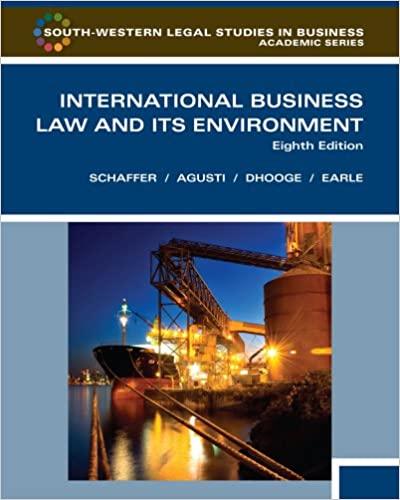Question
Question 1 : A Florida Circuit Court judge dismisses your lawsuit. Your next step is to take it to: A. The District Court of Appeals
Question 1: A Florida Circuit Court judge dismisses your lawsuit. Your next step is to take it to:
A. The District Court of Appeals for your region
B. The Florida Supreme Court
C. Nowhere, circuit court rulings can't be appealed
D. The Eleventh Circuit U.S. Court of Appeals
Question 2: Which is these is a false statement about U.S. District Court judges?
A. Their decisions are binding on all other U.S. District Courts
B. Their decisions are appealable to the Circuit Court of Appeals
C. They can serve for life
D. They are appointed by the president and confirmed by the Senate
Question 3: What happens if the Florida Legislature passes a statute that directly conflicts with the U.S. Constitution?
A. The Florida law is void, because the Constitution overrides contradictory state laws
B. Nothing, because courts can't declare state laws unconstitutional
C. Nothing, because state and federal laws operate independently
D. The Florida law is valid, because states are recognized as the supreme authority
Question 4: Imani believes a government employee is violating her constitutional rights. She can ask a court for each of these, except for:
A. An injunction
B. A temporary restraining order
C. A writ of discharge
D. Money damages
Question 5: The Georgia legislature passes a law criminalizing "blasphemous" speech in public, without defining what "blasphemous" means. Lil Nas X can't tell whether it applies to song lyrics, so in fear of being arrested, he cancels his Atlanta concert. This is an illustration of:
A. The Sullivan principle
B. The chilling effect
C. The public forum doctrine
D. Intermediate scrutiny
Question 6: A cheerleader at FSU kneels on the sidelines of a football game to express her views about race discrimination. This is an example of:
A. A traditional public forum
B. Symbolic speech
C. Prior restraint
D. The heckler's veto
Question 7: A public school could not use its authority under Hazelwood v. Kuhlmeier to...
A. Order a student to remove a T-shirt that endorses a candidate for president
B. Require the valedictorian to get her graduation speech pre-approved
C. Withhold a yearbook column graphically describing a rape
D. Remove sexually explicit song lyrics from the school play
Question 8: Which of these would be a viewpoint-based regulation of speech?
A. "No electronic bullhorns in the park"
B. "No anti-abortion demonstrations within 100 yards of a clinic"
C. "No chalking on the sidewalk"
D. "Hats must be removed in the courtroom"
Question 9: The county commission passes a content-based ordinance making it a misdemeanor, punishable by a $50 fine, to play rap music in public. The most likely outcome is:
A. Nothing will happen, because the First Amendment doesn't apply to counties, only states
B. The ordinance will be thrown out, because content-based regulations get strict scrutiny
C. The ordinance will be declared legal, because content-based regulations get intermediate scrutiny
D. The ordinance will be declared legal, because music isn't considered "speech"
Question 10: Colin sues the San Francisco 49ers NFL football team for violating his First Amendment rights when he lost his quarterbacking job for kneeling during the national anthem. What happens?
A. He wins, because kneeling is expressive conduct
B. He loses, because federal law requires everyone to stand for the anthem
C. He loses, because NFL football teams aren't government agencies
D. He wins, because the team's policy gets strict scrutiny
Question 11: Why was the Zenger trial an important historical landmark?
A. It's the first time a court applied the First Amendment to state government
B. The Supreme Court recognized the "true threat" exception to the First Amendment
C. Support for sedition laws declined after Zenger's acquittal
D. The Supreme Court found that criminal libel laws are constitutional
Question 12: Why are "seditious libel" laws considered to be contrary to the First Amendment?
A. They criminalize criticizing the government, which the First Amendment was intended to protect
B. Nothing is wrong with sedition laws, they're valid and constitutional
C. Because they repeal the criminal penalties for libel
D. Because the right to commit libel is fully protected by the First Amendment
Question 13: In a Supreme Court opinion, Justice Kagan writes that government regulations of speech are presumed to be unconstitutional unless there is an overriding justification. She believes in:
A. The preferred position balancing theory
B. The access theory
C. Textualism
D. The absolutist theory
Question 14: The Supreme Court's Brandenburg decision is a landmark in the law of "incitement" because:
A. It establishes that "incitement" is protected by the First Amendment and cannot be punished
B. It allows the government to prosecute people who advocate repealing the military draft
C. It makes the government's burden to prosecute people for incitement easier, so more people can be jailed
D. It requires proving that the speaker intended to incite imminent lawless action
Step by Step Solution
There are 3 Steps involved in it
Step: 1

Get Instant Access to Expert-Tailored Solutions
See step-by-step solutions with expert insights and AI powered tools for academic success
Step: 2

Step: 3

Ace Your Homework with AI
Get the answers you need in no time with our AI-driven, step-by-step assistance
Get Started


